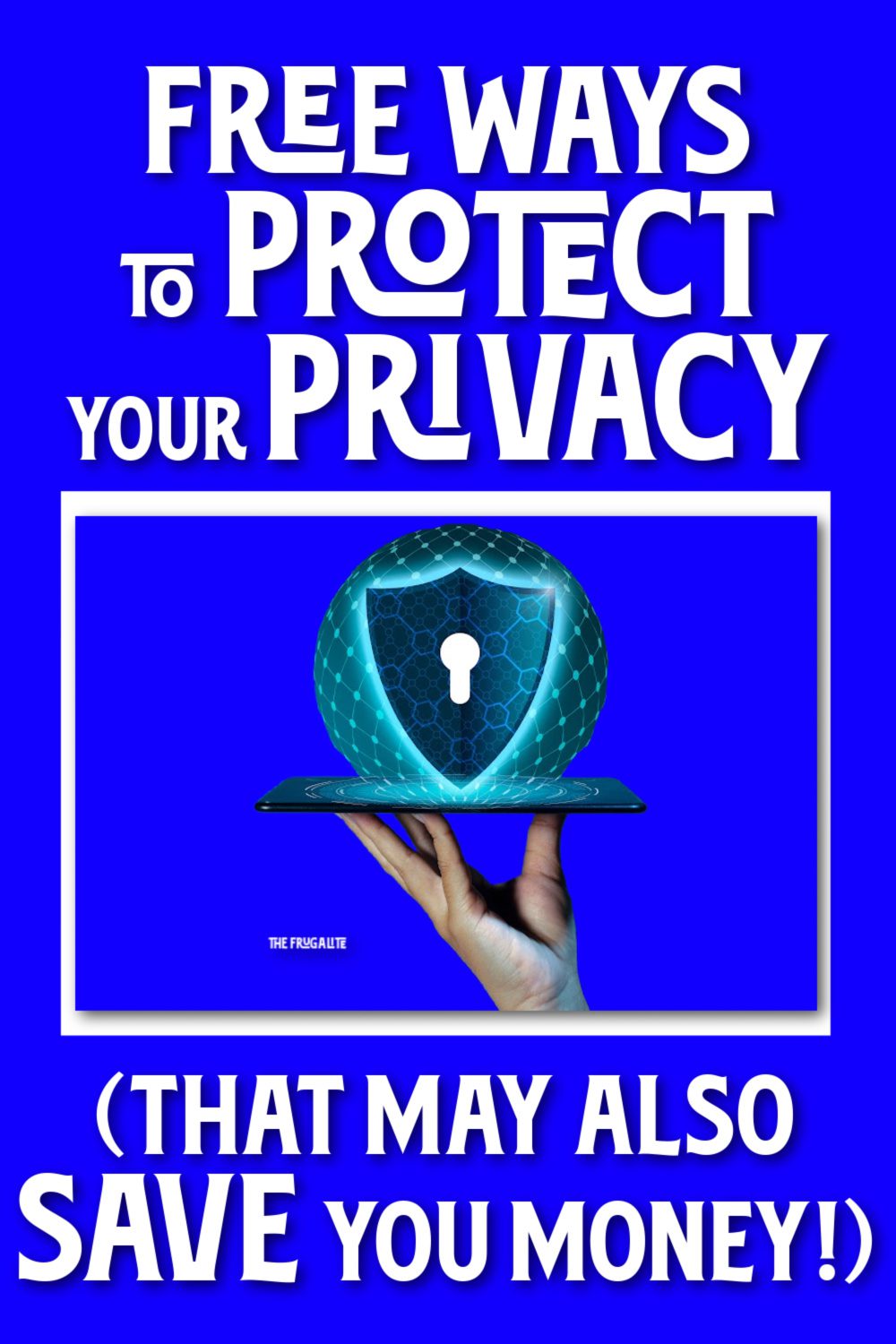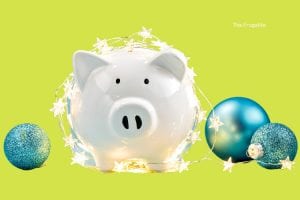(Psst: The FTC wants me to remind you that this website contains affiliate links. That means if you make a purchase from a link you click on, I might receive a small commission. This does not increase the price you’ll pay for that item nor does it decrease the awesomeness of the item. ~ Daisy)
By the author of What School Should Have Taught You.
In many ways, privacy is dead in the modern world. We’ve forsaken privacy – and everything that entails – for convenience in many different aspects of the modern world. I think that privacy has gradually grown to be more and more of a topic of interest for the average joe walking down the street, however, and even if you are just now awakening to the fact that social media is making a LOT of money off of your information, and that you’ve already pumped a lot of that information out there, there are still free ways to protect your privacy that you can do.
And as you will see, some of these ideas will actually help you to SAVE money.
Don’t put social media apps on your phone.
One app, in particular, has recently updated its privacy policy so that they essentially have full access to the information you have on your phone should you download its mobile app. Though I haven’t specifically looked into the privacy policies of other social media platforms of late, I wouldn’t be surprised if they all had similar policies in place.
And, for what it’s worth, I don’t trust any of them anyway. Even if such wasn’t explicitly listed in a social media company’s privacy policy, I wouldn’t trust them to keep my data safe in the first place.
Stay off social media as much as possible.
Ideally, I would urge you to delete all of your social media accounts ASAP. These contain a massive wealth of information on you, and that data is constantly being sold to others. If you don’t feel comfortable with deleting those platforms, at the very least, I would urge you to limit the amount of time you spend on them, to click as little as possible, and be a lurker in the background.
This is absolutely free and will help you to protect a LOT of your data.
Read what other people have to say if you must, but don’t post or like things yourself. Also, keep in mind that a lot of information can be gleaned about you just by looking through what pages you follow or who your friends are.
Use cash.
Going to the bank at the beginning of the month to withdraw cash for the envelope system of your budget will not only save you money in the long run, but it will also protect your privacy. If you are constantly using your debit or credit cards to make purchases, you are telling those companies that run those cards what it is that you’re buying.
That information about you will then be sold to advertisers and marketers (and others) so that they can not only build a complete profile on you but better tailor their ads towards you so that they can manipulate you into buying other products.
So, you’re using cash saves you money because A) you’re using the envelope system, and B) you’re protecting your finances from manipulation by an advertiser. It’s a win-win for both your budget and your privacy.
Use a VPN.
There are plenty of free VPN platforms out there that will greatly improve your level of privacy. I think this should be a given for you every single time you go online, whether via your phone or at your home computer.
Just like using cash, if you use a VPN regularly, you deny advertisers the ability to discover what it is that you have an interest in. If they don’t know that you’re a huge fan of cooking with a Dutch oven, then they won’t know to inundate your sidebars and emails with ads about Lodge cast iron, camping gear, cookbooks, and the like.
You’ll actually save money by protecting yourself against targeted ads DESIGNED to manipulate your purchases.
The only catch with free VPN services is that you’re going to get inundated with ads every time you go to turn on or off your VPN. Don’t let the convenience of being able to access the Internet instantaneously cause you to put a significant amount of your data out there all because you couldn’t sit through a 30-second deodorant commercial.
Use a secure email account.
Both protonmail and tutanota will allow you to create a FREE email account that will better protect your privacy. You won’t be able to let as many messages sit around in your inbox, but both of these options give you access to fully encrypted email capability.
As is typically always the case with any “privacy company,” there have been some security concerns with various “security emails,” but the point is that you will have an exponentially greater level of privacy if you use either of these options compared to Silicon Valley companies and it won’t cost you a dime.
Use Signal.
If you’re using the stock messaging device on your smartphone, you’re sending all of your texts and calls out in the clear. This means that anybody with the right equipment can intercept those messages and calls and read/hear them in their entirety.
You can download Signal for free, however, to encrypt those communications, and it won’t cost you a dime. Understand that Signal has had it’s own share of privacy “questions,” (which it claims are untrue) but it’s still a better option than sending your communications out in the clear.
Leave your phone at home is one of the best free ways to protect your privacy.
I think this is one of the most important things you can do on a daily basis to protect your GPS coordinates and conversations from being listened to by your smartphone. There’s a reason that Siri responds when you say her name. It’s because the phone is always listening.
Leaving your phone at home when you don’t need it won’t cost you a dime and will keep advertisers (and others) from getting their hands on what stores you regularly shop at. The stores around you collect the data on the phones that are within reach of their radio receivers. That data is then sold to data harvesting companies. Do you remember the movie Minority Report, where the tailored ads accompany shoppers through the store? That’s very much what is happening here.
Much like using cash, this, in turn, allows you to protect yourself from targeted ads that will manipulate you into spending money on products and services you would have otherwise not purchased.
So not only is this privacy hack free, but I would argue it will actually save you money in the long run. People lived with only landlines for years. I don’t see why we can’t return to it in many cases. Not all, but many of them.
Are there other free ways to protect your privacy that you know about?
The world of privacy is constantly changing, and there are always new things popping up that cause security breaches and new technologies to combat these breaches. You don’t have to spend hundreds of dollars on identity protection services, VPNs, and other privacy tools, though, to give yourself some base level of protection.
Are there some other free or inexpensive ways to protect your privacy that you want to add? Let us know in the comments!
About Aden
Aden Tate is a regular contributor to TheOrganicPrepper.com and TheFrugalite.com. Aden runs a micro-farm where he raises dairy goats, a pig, honeybees, meat chickens, laying chickens, tomatoes, mushrooms, and greens. Aden has four published books, The Faithful Prepper, What School Should Have Taught You, An Arm and a Leg, The Prepper’s Guide to Post-Disaster Communications, and Zombie Choices. You can find his podcast The Last American on Preppers’ Broadcasting Network.












5 thoughts on “Free Ways to Protect Your Privacy (That May SAVE You Money!)”
The advice to use cash whenever possible has worked well in the past. The problem is that the Dementia Biden government has sold out to the globalist plan to replace cash with digitally trackable (and instantly taxable) money (being called “Biden bucks” in the US) — and in the process make physical cash (and any hope of 4th Amendment privacy) worthless. I’m seeing some credible predictions that this may begin as early as December 2022.
There are some early thoughts on YouTube about ways to defend against a cashless economy. How effective those might be I don’t know yet.
Some 90% of central banks worldwide have climbed onto this globalist bandwagon (for digital money only) and are already bullying hold-out countries. Communist China has already banned any competitive crypto currency their government didn’t create to control. The US approach is only moderately different — the SEC is looking at ways to “regulate” any non-government cryptos so they won’t be competitive. Expect our government to heavily tax such non-government cryptos as well.
In the past barter has often been used when money became unavailable or worthless. Grains and alcohol have been used in US history but that was in local economies unlike today’s era when so much commerce has gone online for very long distance transactions. Can barter work for some online long distance transactions? Possibly…
Today’s US government is also interested in creating its own version of communist China’s “social credit” system where everything you do or say is tracked by the government that’s totally willing to punish, demean, and isolate you for violating whatever is politically correct at the moment.
Whether fee-based privacy-teaching courses such as this
https://privacyactionplan.com/
will be able to cope with such governmental tyranny remains to be seen.
In the meantime there are some benefits to using websites like
https://privacy.com/
to generate substitute charge card numbers for you (at no cost to you) so that you can limit such substitute numbers for specified sellers, whether one or several, and whether for one time use, multiple times, or unlimited uses. The benefit is that it does a charge card scammer no good to steal your substitute card numbers because they would be useless to him or to anyone he might try to sell such data to.
Privacy in purchasing has already come under fire. People who order ivermectin or hydroxchloroquine from other countries are finding that US customs may interfere. The US post office may be a problem. Purchases of parts for “ghost guns” are being opposed by some shippers and it’s a good guess that charge card providers like Visa or Mastercard may also block such purchases.
Whether or not overseas companies such as glintpay.com (a UK company that provides you with a MasterCard charge card so you can make payments backed by gold bullion in Swiss vaults) will be able to survive the tyranny of the coming cashless economy is unclear.
Another easier privacy problem to solve is the porch pirate issue. Back when I was foolish enough to use my home address to order products, UPS would drop packages on my front doorstep but could not be bothered to ring the doorbell. That meant sometimes that a package could sit there in full public view most of the day until I could finally retrieve it. Switching to a local shipping and receiving service that would notify me by email whenever a package arrived was a vastly more secure and private solution.
Also, a PO box was an excellent way to replace high value financial mail that was often ending up in my neighbors’ mailboxes.
If you own the house you live in (or have any other properties) … you are a lot more vulnerable to frivolous lawsuits. When lawyers run a search prior to such evils to see if you have any assets worth stealing, they will search on your name. Real estate investors learned long ago that whenever possible they would put properties into a land trust where only the trustee’s name would appear in public records. That solved much of the trash lawsuits problem.
–Lewis
Give Biden bucks a rest. Cash will never go away and again, where ever are you even reading/hearing about this scare tactic?
Sporting/entertainment venues have figured out how to keep those they don’t want to attend out and cut staff. You can’t buy a 50/50 raffle at some sporting events unless you hand over plastic – thanks but no thanks.
Unless you need to use GPS, turn off location services on your iPhone. And turn on do not track and other privacy features. Sure, isn’t going to make you anonymous but it does help.
Not just social media apps, most apps IMHO. Besides taking up space and likely compromising privacy, security is an issue.
For years, probably decades, manufacturers insisted you’d have no warranty if you did not fill out the card – not so. Big bucks were made off this data in the form of selling mailing lists. Too many people assumed the manufacturers were honest and kept their info private.
When will people wake up and listen? Don’t be so quick to discount and judge what more knowledgeable people are trying to say for your benefit! Check out James Rickards and his credibility and credentials before using the words “scare tactics”. This is truth in what’s happening. It’s okay if you wish not to believe, but stop accusing people of using scare tactics about that which you do not know! Read, listen , and learn, but not your confirmation bias.
You can travel with your phone turned off and in a foil bag. That way you will have privacy and still have access to your phone in case of an emergency.
+1 on the phone cover. I don’t carry a phone most times. When travelling, it is secured as above.
When I order anything online, I use a prepaid debit card bought with cash.
I always use cash anywhere possible. Always have. (Very) old habits die hard.
As an aside; beware barter clubs. The IRS is watching them.